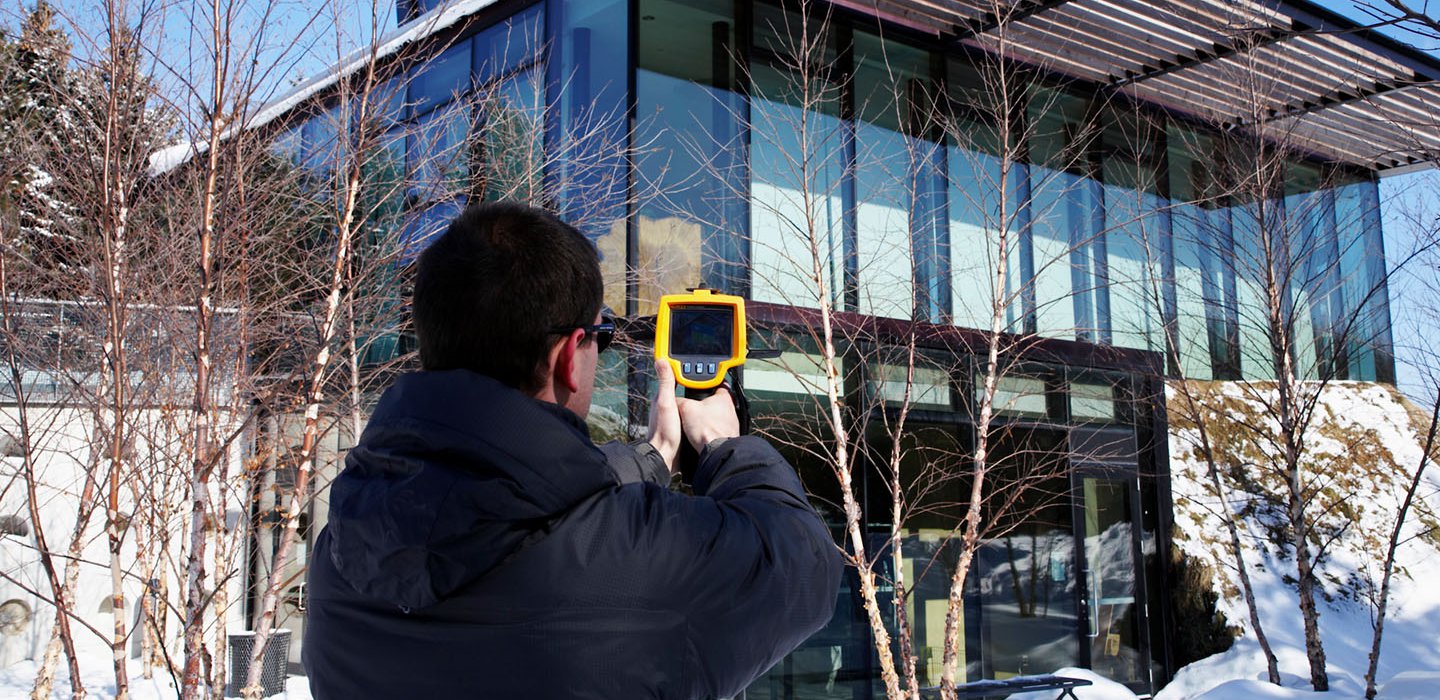Applied research in Sustainable Architecture and Energy Efficient Construction involves projects that seek to minimize the negative environmental impact of buildings by efficiency and moderation in the use of materials, energy, and development space, both in construction processes and resulting infrastructure. Partners collaborate with the faculty and students of programs like Architectural Technology, Computer Engineering, Project Management, and Sustainable Energy and Building Technology to work on these projects, creating more sustainable architecture. Collaborators can work on sustainability projects at Humber in facilities such as the Sustainable Energy Labs, Energy Auditing Lab, Building Automation Systems Lab, and the Renewable Energy Lab.
Sustainable Architecture
Off-Grid Organic Food Shed Capstone Project with the City of Brampton
Phil Fung / Faculty of Applied Sciences & Technology
Keeping his students constantly involved through capstone projects is a priority for Phil Fung, Professor, Faculty of Applied Sciences & Technology. He stresses that hands-on experiential learning and exposure to community and industry needs is the only way students can truly learn. An example of Phil’s interaction with students is the Off-Grid Organic Food Shed project with the City of Brampton. Phil learned of the Brampton Backyard garden initiative through one of his students and decided to get involved. As a result, Phil conducted an Insight seminar about the Food Shed, and Humber’s students were involved in a Capstone project.
The Off-Grid Organic Food Shed is provided by Nature Harmony and is a zero-energy, zero-waste, carbon negative, greenhouse structure that will grow produce from the food shed and be donated to Regeneration Outreach Community to feed families in Brampton, as part of the 2021 Backyard Garden Program. This innovative technology contains its own ecosystem, using a combination of automated soil, hydroponics, and aquaponics systems to grow edible organic fruits and vegetables and even edible fish.
Projects
Caring for the Thunderbird’s Nest: Geophysical and Machine Learning solutions to characterize and monitor inequitable Exposures to Ground and Air Pollution
Funder: CIHR | Program: CCSIF | Maria Jacome / Faculty of Applied Sciences & TechnologyThe project will address a health and environmental crisis in the FWFN community – a cluster of leukemia in very young community members who spent time in childhood in an area with over a century of industrial development, including pulp and paper, metallurgy, coal-fired power, rail, chemical plants, contaminated dredge, industrial disposal sites, fueling stations, and other industries. The community has noted that children under five who spent time in a residential area adjacent to the industrial lands were most likely to experience this atypically young onset of leukemia. The industrial lands have been subject to Environmental Site Assessments (ESAs) paid for by the government and industry as part of comprehensive land claim processes. Despite dozens of ESAs over several decades, FWFN leadership does not have relevant information in a format that is useful for the community to make decisions. They also do not trust the reporting practices of the liable parties who have been obliged by law to finance the ESAs. This project will work in a nest of collaboration with FWFN in a model of integrated knowledge translation – researchers and community learning together
Design Enhancements of Mobile Air Monitoring System
Funder: NSERC | Program: Engage | Sherif Hanna / Faculty of Applied Sciences & TechnologyEcosystem Informatics Inc. (ESI) is a company incorporated in 2019 in the field of environmental
engineering developing patent-pending real-time and mobile environmental measurement tools to overcome the sample collection and location specific measurement limitations. This project will design and develop a novel case for the system to collect environmental measurements while mounted on a vehicle. The main technical challenge in developing the enclosed measurement system is the turbulence associated with the airflow into the system as well as the presence of dust, water vapor and contaminants that are entrained with the airflow into the system. Humber will provide technical leadership in modelling the air flow inside the engineering system and reducing contaminant interference with measurements through design modifications and in-situ testing. The benefits of this project will be transferred to ESI to overcome the limitations of traditional measurement techniques and offer a more accurate and reliable measurement
alternative product.Low carbon retrofit of a single family house into multi-unit apartment building
Funder: NSERC | Program: ARD | Dragos Paraschiv / Faculty of Applied Sciences & TechnologyPeel Passive House Consulting (PeelPHC) is the most experienced Passive House (PH) consulting firm in Canada, delivering PH consultancy, training and certification services. PeelPHC is interested in developing a partnership with Humber College with the intent to advance the development of PH expertise in Canada and specifically in the GTA. This project involves a semi-detached home in Toronto that will be retrofitted to a 3-unit apartment to the EnerPHit standard (Passive House Institute, 2015). The house has a common design that is representative of many homes across the city. This project seeks to establish a technically and financially feasible model for low carbon residential retrofits that can be replicated at scale. It also serves to increase density without changing the characteristics of the neighbourhood. Both PeelPHC and Humber College will benefit from the knowledge, skills, and experience they develop that will be directly applicable to the emerging low carbon retrofit industry. PeelPHC will be well positioned to support other homeowners and developers in realizing low carbon retrofits. The results of the research project will contribute to the development of a process and published resources that will facilitate the scale up of retrofit projects in Toronto and beyond.
Humber College's involvement will demonstrate their leadership in supporting the necessary transformation the construction industry must undertake to reduce its greenhouse gas (GHG) emissions.
